[Original by Kazuto KANAOKA, 2020 Public Relations Intern (October 12, 2020); Translated by S. Tokugawa/M. Olagoke]
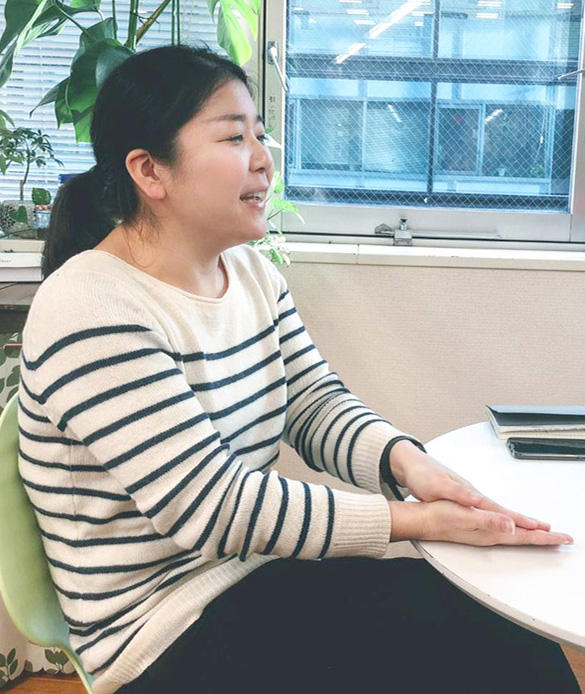
Ms. Osawa always speaks with her bright smile. I have never met her in person because she works from home, so I want to see her someday.
Hi everyone! I am Kanaoka, the 2020 Public Relations intern for JVC. The 2020 interns continue to conduct staff interviews as we did last year. You can read previous staff interviews in the previous articles. I hope you will enjoy them! For the first round of staff interviews in 2020, I interviewed Mizuho Osawa who takes charge of the Palestine Project. Her motto is “Enjoy everything!” We the interns currently work from home, and she held lunch conversation meetings between the JVC staff and us. The impression of her is that she is always smiley and lively.
First, how did you spend your schooldays?
I fairly enjoyed my schooldays. This is a matter of course though, I learned theory in the lectures, and I felt ashamed in the internship because I could hardly do anything, so I wanted to graduate and start working early. I strongly hoped to gain experience and proceed to the next step.
What motivated you to pursue a nursing career?
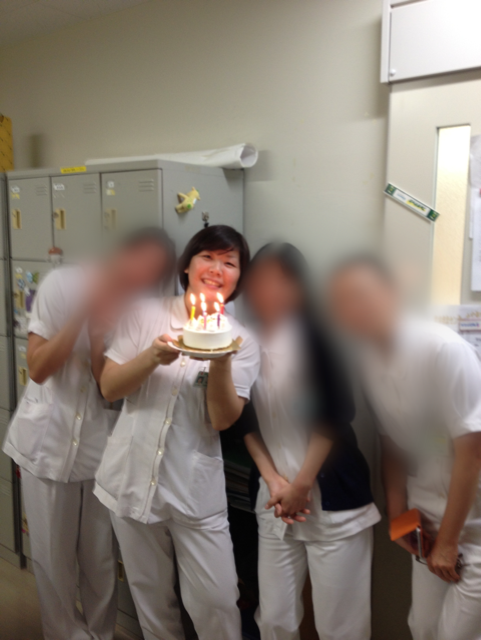
During her time as a nurse.
Somehow, I had always been aiming to go into emergency medical support overseas. However, it was difficult for me to become a doctor, so I decided to become a nurse. (lol)
In my undergraduate days, I strived to join Doctors Without Borders or the Red Cross.
After graduating, I went up to Tokyo from Hokkaido and worked for four years at a hospital for emergency care.
I felt something was off about my work, so I quit my job.
Since I really love Hokkaido, I didn’t want to leave there.
Nevertheless, I could surely get many opportunities to learn in Tokyo, so I tearfully went up to the capital. (lol)
When did you get interested in international medical support?
My parents are both former members of the Japan Overseas Cooperation Volunteers (JOCV). My father had been working for five years as a professional at JICA and my mother was a nurse. I saw my parents’ acquaintances in my childhood, and they made me feel attached to international cooperation. Some of them were from Japan Red Cross and WHO, so I vaguely knew such kind of work. I felt it was very unequal when I saw children of the same age as I lived in difficult circumstances on a documentary program.
What did your colleagues think about their work as nurses?
Those who are motivated and have their own perspective of nursing studied during holidays, while some just worked for their living. I was lonely because there was no one who strived for the international medical support to share my opinion with at university.
What brought you to work at JVC?
I went through some steps to start working for JVC.
When I worked at the hospital for emergency care, half the people carried to the hospital were unconscious. I felt ethically uneasy to treat them without their intent. If the patient is unconscious, the treatment will be decided by his/her family’s opinion unless the intention information is told to the family beforehand. It is not convincible that patients cannot choose how they live including the end of life.
Even though it is also difficult in Japan, we need to treat patients with a few medical instruments for emergency care in troubled areas abroad, so I imagined that I would face the same situation.
People return to their daily life after treatment in hospital. However, some of them cannot do it completely if they have a remaining disability. The younger they are, the longer they live with the remained disability. When I thought of that, I got interested in the regional health field that I can keep being involved in including the perspective of prevention rather than the temporary work at hospital.
After that, I applied for JOCV and was assigned in a small hospital with about 14 beds in Paraguay. I engaged in the improvement of the medical services and prevention enlightenment for lifestyle disease.
Japanese volunteers were not allowed to perform some of the medical treatments like injection because we only had a nurse license valid in Japan. The nurses working with me in the hospital were proud of themselves as a nurse. They were like, “Why don’t you do medical treatments?” Our roles were not told to them correctly, so we were in a tough situation to operate.
From the start I wanted to be involved in the health enlightenment activity to let people know about the physical body to prevent diseases by themselves rather than undergoing treatment after being sick. After a year passed, I started health education at a school in parallel with the activity at the hospital as I wanted to do it for children. The school principal was more forthright than I expected. She accepted me immediately and she said to me, “Could you do it? Sure!”
What I taught there were basic things like washing hands and teeth brushing. There were no such habits instilled among Paraguayans and 90 percent of children had a bad tooth by research. The children were meek and welcomed me, so I was like half a teacher and I enjoyed the time very much.
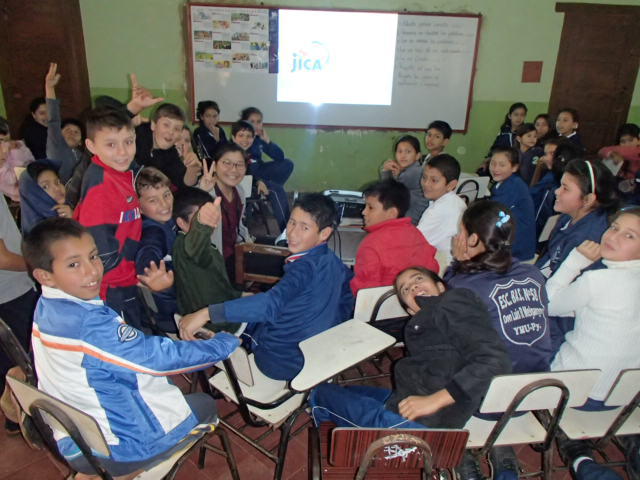
Paraguayan kids. They have good smiles!
Did you think about working locally at an international NGO or NPO there?
I didn’t think so when I engaged in JOCV. I was aware of an atmosphere that the Paraguayan people help each other to spend life together. They know very well about their government, cultures, and history. I was asked about Japan many times. It made me realize things I have never thought about. I had thought of myself as simply being in the field of health and medical treatment. Nevertheless, while living in Paraguay, I learned that the cause of harm to human health was not only related to health and medical treatment, but complicated problems like education, economics, and so on. So, I then thought that I would like to be involved in the activities which are not particular to the health and medical fields.
You returned to Japan because you wanted to do a wide range of work.
Yes. I considered what I would do next. I imagined that it would not be easy for an inexperienced person to join an NGO, so I participated in the internship of an NGO for half a year, which was mainly for emergency support.
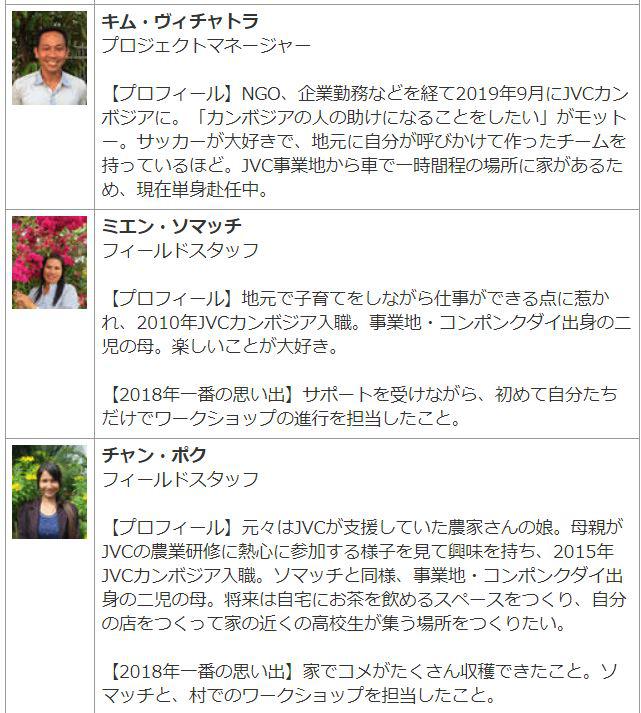
JVC publishes the profiles with photos of staffs at the local offices. This is the one from the local office in Cambodia.
After that, while job hunting, I accidentally found a vacant post at JVC.
I dug it up and the organization was highly transparent, and I got a favorable impression that it is “visible” as they publish their staff profiles, so I decided to apply for JVC. Surprisingly, there are not many NGOs which make staff photos public.
Furthermore, few of them introduce their local staff as JVC.
I applied for the post of the Sudan project at the Tokyo office, but as a matter of fact, I was not strongly particular about Sudan. Well, I originally didn’t have any preference about region or issues.
That comes from my thought that I want to support people suffering from uncontrollable artificial matters like politics and authority.
Soon after that, you were assigned to the Palestine project.
I spent half a month on orientation activities and suchlike, and then suddenly I was assigned to be transferred to Palestine for two months. After returning to Japan, the President and Secretary General called me, and I was tensely like, “What? Fired? I made a bad break?” They sounded me out on the idea of taking over the Palestine project in Tokyo. I took it upon myself.
I had been considering working locally, but for the sake of my family, I decided to stay a while in Japan. However, while working at JVC, I feel working locally is not the only way, but I can give several kinds of supports from Japan, and it is also important. Working overseas is not the sole job for me.
I now think back on what I have done, and I notice that I unintentionally spent two halves of my working term each working at the Japan office and overseas.
What is the difficulty of working in an international cooperation?
I am always conscious of working as a team anywhere. I went through hardships in promising and arranging programs with local partners who are associated with JVC.
At the Tokyo office, I manage with a view of the whole team, and at the same time, I communicate with the supporters. I enjoy working very much. Staffs of JVC are friendly and supportive including the President and Secretary General, so I feel fortunate. I am glad and feel rewarded to have opportunities to talk with the supporters and receive responses from them.
Let me hear about humanitarian education in Palestine. In your previous article on the Palestine summer camp, you asked a boy about women’s human rights. I suppose it cannot be answered immediately but it is worth asking. How do Palestine women think about female empowerment?
The organization that I plan to act with is run by a female President and they value women’s human rights. However, some people in society think that the current circumstance of the rights should be maintained irrespective of gender. In Palestine, women’s human rights are restricted by thoughts that men should protect women because they are weak, but some women regard it as fine.
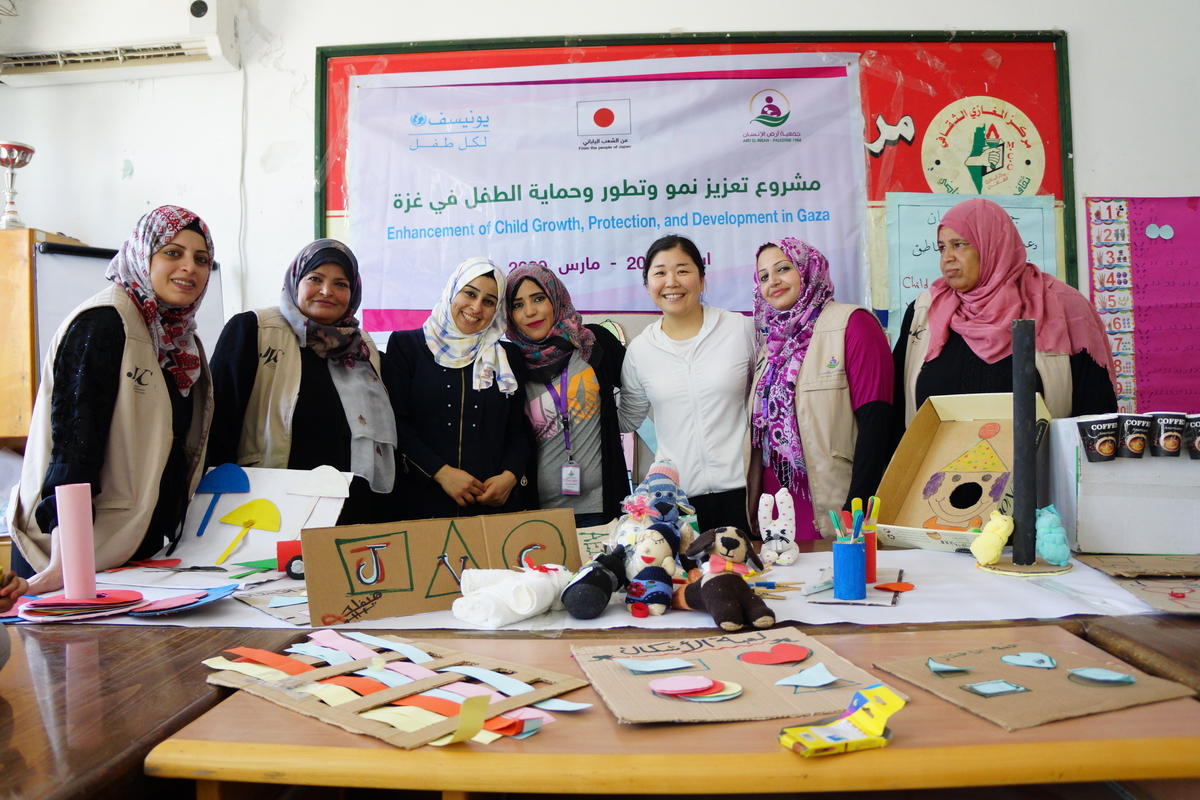
One frame of the Palestine project!
Appealing to them for empowerment might be officious interference…
In my opinion, it would be nice if they could know that there are various thoughts. Since what they eventually think depends on themselves, I believe it would be good if they could get varied choices.
What do you care about when you talk with the women in Palestine?
I prevent myself from saying something decisively. I hate to express my thoughts like that. Needless to say, I pay attention to the talks on deep personal matters like one’s family affairs.
I hear Palestine is a nice place to live in!
Palestinians are pro-Japanese and very kind. I reckon the reason is that Japan is well known for its animations and technology. I was surprised that they knew about the atomic bombings during World War II. They spoke of it using the words Hiroshima and Nagasaki. I suppose they have a good impression of Japan as it succeeded in the postwar restoration and has not been at war for 70 years. An occupation and blockade in Palestine are being undertaken, so more peaceful countries impress them favorably. Since they have a good impression of Japan, I would like Japan to approach the issues with its own way.
There are various ways of participating in an international cooperation. Do you have any ideas on how to be involved in it?
It is a bit of a difficult question. In my old days I took the plunge into job sites. You should challenge yourself anyway. I take things optimistically. I think that it will turn out okay if I go to southern islands when I get lost. (lol) Except under a peculiar circumstance, I would not die even if I challenge something. The background of behaving freely comes from my thought that I can go back to the medical field if my challenge ends in failure. I feel many young people cannot step forward due to a deep concern about their future, but I want them to take challenges actively. However, there are many things to acquire for such jobs, so I recommend that you listen to various kinds of people and prepare.
In addition, working as a staff is by no means the only way to be part of an international cooperation. You can have various ways of participating in it, such as volunteering, internships, donations, and the like. Thus, it would be better to keep doing these in harmony with your lifestyles and life plans.
Closing remarks
The next interview will be Ms. Inami who takes charge of accounting and labor management. She is good at cooking Vietnamese cuisine. We will feel a warmhearted atmosphere of Southeast Asia in the interview.
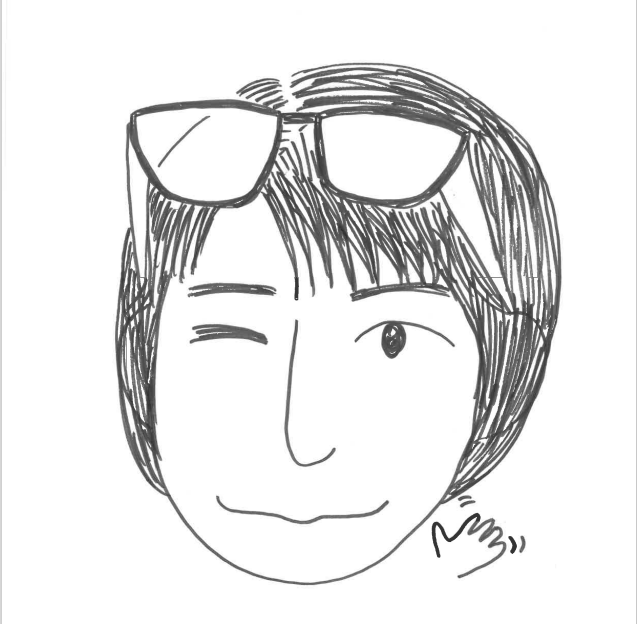
Ms. Osawa painted a portrait of Ms. Inami!
